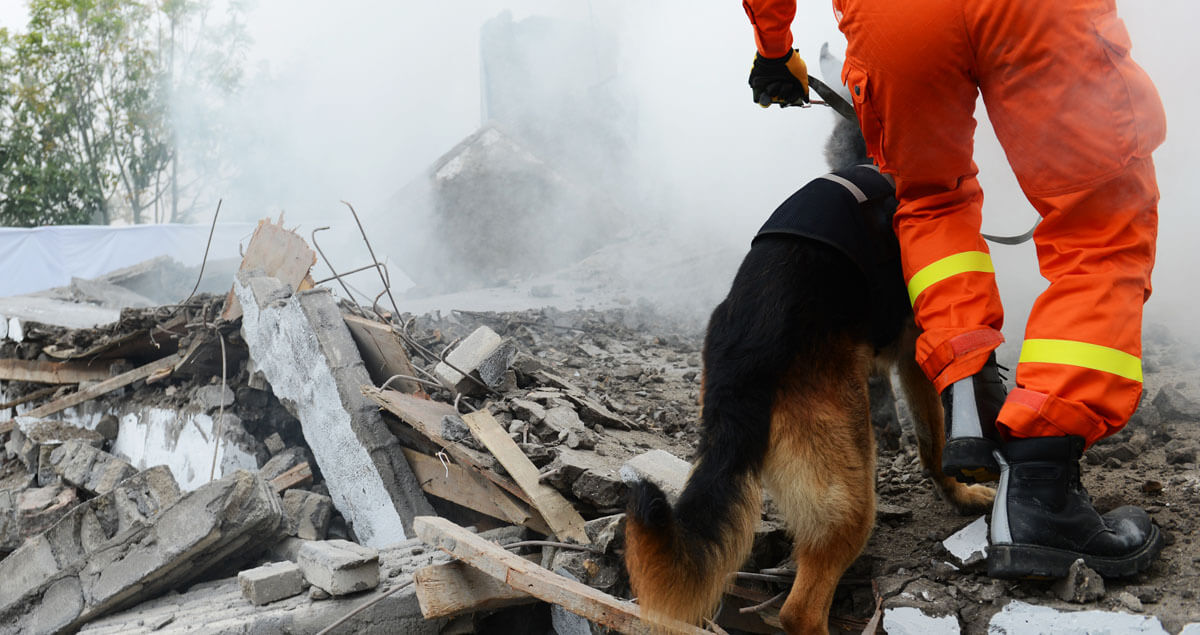Blog

Earthquakes can happen anywhere. Are you ready?
People living in earthquake-prone areas are generally more aware of earthquake safety than others. Consider California and its history of earthquakes, for instance. Awareness of the risk is relatively high in the state, according to Munich Re. California’s building construction standards are among the strictest in the world, and many people and businesses participate in International ShakeOut Day, which has become a worldwide day of action and a helpful reminder of how to protect yourself and others during an earthquake.
But even in California and other areas where earthquake awareness is high, the number of people with earthquake insurance coverage is relatively low. In many counties, fewer than 10% of residential buildings are insured against earthquakes, and coverage only approaches 25% in highly exposed metropolitan areas.
This may be an even bigger problem when you consider that earthquakes are more common than most people think. Small earthquakes (magnitude 2 and smaller) occur several hundred times a day throughout the world. Major earthquakes (greater than magnitude 7) happen more than once per month, and great earthquakes (magnitude 8 or higher) occur about once a year, according to IRIS, a university research consortium dedicated to monitoring the earth and exploring its interior.
Because an earthquake can collapse buildings and cause heavy items to fall, injuries and property damage are relatively common. And while certain areas are statistically more susceptible to earthquakes than others, it’s important to keep in mind that no place is immune to the possibility. Preparation is your best defense.
Before an Earthquake
- Determine your risk. Not sure if you live in a high-risk area? Visit earthquaketrack.com to learn about the history of earthquakes in your neck of the woods. You may be surprised.
- Secure your home. If earthquakes are relatively common in your area, do what’s necessary to secure and reinforce your home. Consult a builder or other professional to assess your home and determine what steps are necessary to make it more earthquake-resistant. Take the time to secure large items such as TVs, bookshelves, cabinets and major appliances that could fall or slide when shaking occurs. Even smaller objects such as picture frames, mirrors and hanging artwork can cause damage and injury.
- Sign up for emergency notifications. While there is no advance warning for an earthquake, you can sign up to receive wireless emergency alerts that will be texted to your phone if an emergency occurs. Organizations such as FEMA and the American Red Cross offer free apps with information about temporary shelters, first aid and recovery assistance.
- Protect yourself and those around you. Talk with your loved ones and coworkers about what to do if an earthquake occurs. Create an emergency plan of action and agree on a place where everyone can meet after the danger has passed.
- Prepare an emergency supply kit. After an earthquake, you could be without electricity for days. Keep the necessary supplies on hand, including food and water, flashlight, fire extinguisher, blankets, medications, batteries, charging devices – and a whistle (to help rescuers find you). Please don’t forget your pets; they will need food and supplies as well.
- Talk to your insurance professional about earthquake insurance. Standard homeowners insurance does not cover damage from earthquakes.
During an Earthquake
- Protect yourself. Drop to your hands and knees before something knocks you down. Cover your head and neck with your arms, and crawl to an area where you are protected from falling items. If possible, grab on to a sturdy piece of furniture.
- Respond based on your location. If you’re in bed, stay there and cover your head and neck with a pillow. If you’re in a moving vehicle, pull over and wait it out – preferably away from any buildings, trees, overpasses, underpasses and utility wires. And if you’re in a high-rise building, avoid using the elevators and be prepared for fire alarms and sprinklers to go off.
After an Earthquake
- Evaluate your situation. Check yourself for possible injury and help others around you whenever possible. Be on the lookout for additional items or debris that could fall. If you’re in a damaged building and you can see a safe and easy way to exit, leave the structure as quickly as possible. If you’re trapped in a building and you have a cell phone, call or text for help. You can also bang or tap on a pipe or other hard surface to notify people of your location. Stay as still as possible. Moving around only kicks up dust and debris, which can make breathing more difficult.
- Listen to your local news. When the earthquake is over, aftershocks may still occur, so tune in to your local news outlets via radio, social media, phone alerts or TV for up-to-date emergency information.
- Be sensible about electric and gas utilities. Don’t touch electrical equipment if it’s wet or if you’re standing in water, and call 9-1-1 if you smell gas.
- Take pictures. Photograph any damage to your home and property. This could be helpful when filing an insurance claim.
Earthquakes are a threat wherever you live, but residents in certain areas need to be especially vigilant. Take the time to prepare now – before it’s too late – so you can protect your family and your property if the earth starts to shake.
For information only. Not applicable to all situations.
Sources:
-
- https://www.iii.org/fact-statistic/facts-statistics-earthquakes-and-tsunamis
- https://www.iris.edu/hq/files/publications/brochures_onepagers/doc/EN_OnePager3.pdf
- https://www.fema.gov/media-library-data/1408632135401-3d0521fa59d0dd4016e82f08fe7f3732/PrepareAthon_EARTHQUAKES_HTG_FINAL_508.pdf
- https://www.munichre.com/topics-online/en/climate-change-and-natural-disasters/natural-disasters/earthquakes/earthquake-risk-in-california.html







